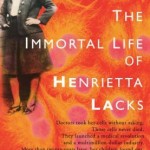Tags
"The Immortal Life of Henrietta Lacks:, HeLa Cells, Henrietta Lacks, Rebecca Skloot, The Henrietta Lacks Foundation
News articles (here and here) in the last week or so have claimed that Henrietta Lacks’ family has finally gained something from the use of her cells.
It isn’t enough.
I know some MillersTime readers are familiar with the story of Henrietta Lacks because many of you cited Rebecca Skloot’s wonderful book The Immortal Life of Henrietta Lacks* as one of your favorite reads a couple of years ago.
From NBC News: “Over the past six decades, huge medical advances have sprung from the cells of Henrietta Lacks, a poor, African-American mother of five who died in 1951 of cervical cancer. But Lacks never agreed that the cells from a biopsy before her death taken could be used for research. For years, her own family had no idea that her cells were still alive in petri dishes in scientists’ labs. They eventually learned they had fueled a line called HeLa cells, which have generated billions of dollars, but they didn’t realize until this spring that her genome had been sequenced and made public for anyone to see.”
A week ago, NIH announced it had reached agreement with the Lacks family, according to NBC: “Under a new agreement, Lack’s genome data will be accessible only to those who apply for and are granted permission. And two representatives of the Lacks family will serve on the NIH group responsible for reviewing biomedical researchers’ applications for controlled access to HeLa cells. Additionally, any researcher who uses that data will be asked to include an acknowledgement to the Lacks family in their publications.”
OK. A first step? Some scientific recognition?
But many careers, scientific advancements and untold numbers of dollars have been made because of the use of the cells taken from Henrietta Lacks’ cervix. Neither she nor her family knew about this for years nor has anyone in the Lacks’ family received financial recompense.
Pardon me, but I don’t think nor agree, as the NBC article and others are saying, that “that failure has now been fixed.”
(*Rebecca Skloots, at least, has tried to make amends. With some of the profits from her book, she established the Henrietta Lacks Foundation, which, according to their website, “strives to provide financial assistance to needy individuals who have made important contributions to scientific research without personally benefiting from those contributions, particularly those used in research without their knowledge or consent. The Foundation gives those who have benefited from those contributions — including scientists, universities, corporations, and the general public — a way to show their appreciation to such research subjects and their families {my emphasis}”)


LAND WAYLAND said:
Are you suggesting that heirs inherit the right to their deceased loved one’s body if it can be of use to others?. I suppose that is already done when permission of either the deceased or the survivors must be obtained for organs to be “harvested” or an autopsy to be done for training purposes.
But this implies that these parts or usages have an economic value for which compensation should be paid. If that is the case, then cadavers should be auctioned off to the highest bidder to produce the maximum profit to the family. This means that, depending on the demand for whatever piece is being sold, everyone can leave a substantial inheritance if they plan it right. Why, if you have the right genes or malady, this could be equivalent to winning the lottery.
My attitude is that once a person is gone from this vail of woe,, they are gone and whatever is left behind belongs to the ages, as long as it is treated with respect and dignity.
Regarding this specific case, the value from the items that were removed from the body is due entirely to the efforts of the reseachers who did the hard work that led to the valuable discoveries. The deceased did nothing to create the unique items that were used, other than be born and eat and sleep regularly.
Is a miner entitled to a share of the profits if the ore that he digs out of the ground is used to make a statue by Rodin or Picasso?. How about the truck driver who moved the ore or the stoker who kept the smelting furnace hot or the store owner who sold the block of clay that was used to make the sculpture?
Land Wayland
Bob T said:
I’ve been thinking about this all day and I haven’t really distilled it in my mind. My reaction to this news when I first heard it was the same as Richard’s. I think the outrage comes not from the ownership issue, including ownership by heirs that Land refers to. It’s more that some common decency has been neglected– even if this is a decency that we, or the researchers, were unaware of when they proceeded with the research and the distribution.
It is hard to define just what that “decency” is but it’s more of a case of “you know it once it has happened.” Somehow it doesn’t seem fair that all this research was done using Henrietta Lack’s cells but none of the famiy even knew about it.
But what bothers me about my reaction is this: I felt that the family should have received some kind of serious monetary compensation. I guess that’s because our society seems to measure everything that way? But I’m certainly not a fan of measuring everything by its monetary value, so what right do I have to think that they should be compensated?
For all we know, the family may not have wanted any monetary compensation. It’s a little presumptuous on my part to assume they would– they might have specifically rejected that, understanding that others could see it as greedy or opportunistic.
Still wondering.
Bob Thurston